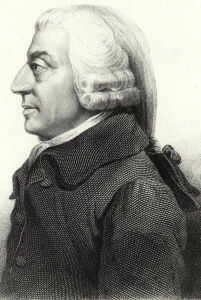
Adam Smith
 Adam Smith |
The Scottish Enlightenment was a period of
intellectual ferment in Scotland, running from approximately 1740 to 1800. In
the period following the Act of Union 1707 Scotland's place in the world altered
radically. Following the Reformation, many Scottish academics were teaching in
great cities of mainland Europe but with the birth and rapid expansion of the
new British Empire came a revival of philosophical thought in Scotland and a
prodigious diversity of thinkers. Arguably the
poorest country in western Europe in 1707, it was now able to turn its
attentions to the wider world without the opposition of England. Scotland reaped
the economic benefits of free trade within the British Empire together with the
intellectual benefits of having established Europe's first public education
system since classical times. Under these twin
stimuli, Scottish thinkers began questioning
assumptions previously
taken for granted; and with Scotland's
traditional connections to France, then in the throes of the Enlightenment, the
Scots began developing a uniquely practical branch of humanism to the extent
that Voltaire said "We look to Scotland for all our ideas of civilisation."
David Hume himself is arguably the most
important thinker in the Scottish Enlightenment. Hume was largely responsible
for giving the Scottish Enlightenment its practical hue, for he was concerned
with the nature of knowledge, and developed ideas related to evidence,
experience, and causation. Much of that is incorporated in the scientific
method, and many modern attitudes towards the relationship between science and
religion, were developed by him. If Hume was primarily concerned with philosophy
and worked less in economics, his ideas nevertheless led to important work in
the latter field. Following Hume's impassioned defense of free trade, Adam Smith
developed the concept and in 1776 published what is arguably the first work of
modern economics - The Wealth of Nations. This famous study had an
immediate impact on British economic policy, and it still informs 21st century
discussions on globalization and tariffs.
|
prodigious |
csodálatos |
| stimuli | ösztönző erők |
| take for granted | magától értetődőnek vesz |
credits:
The text was extracted from Wikipedia The Free Encyclopedia under GNU Free Documentation Licence.